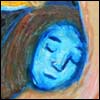It's rush hour in New York, and I'm in a crowded train. The doors slide open and there's a blind man standing in the entrance. People swarm past him as he thrusts out his walking stick and makes his way into the car. A woman jumps up. "Take my seat," she says, and he does.
As I watch him, I wonder what it would be like to be blind and have to rely on others for help like that. Then it dawns on me: I am a person who relies on others for help like that, the guidance I get along my journey of bringing up a child with disabilities.
I'm mom to Max, 7. He has cerebral palsy, due to a stroke at birth (yes, babies can have strokes). Doctors told us he might never walk or talk, that he could have hearing and seeing problems and an intellectual disability. As you can imagine, my husband and I were pretty devastated. I am a person who likes to take charge of things and make them happen. Control freak? Sure, you can call me that. But here was a situation where things felt out of my control. My baby had irreversible brain damage.
I did what I could: I immediately enrolled Max in my state's Early Intervention program. He got out of the NICU after two weeks and at one month old he started getting physical and occupational therapy. He began receiving speech therapy at around six months old, aquatic therapy at a year. We also tried alternative therapies, such as craniosacral therapy, hyperbaric oxygen treatment and, last year, stem cell therapy at Duke University.
Therapy was a whole other world. Typically a person who always liked to figure things out on her own, I was suddenly dependent on these experts to tell me what my baby needed, to teach me to do the exercises that helped his tight limbs loosen up, to give me the hope I so desperately craved.
I also needed support like never before. Mentally, I was drained. I didn't admit it to myself at the time, but I was depressed, too. Having a new baby is never easy; having a baby at risk for serious challenges can feel like water torture. I'd watch him with an eagle eye 24/7, terrified that I'd see something "bad" emerging. I was filled with anxiety. I could discuss it with my husband, Dave, and friends, to some extent, but I didn't feel like anyone really understood what I was going through.
I was so grateful to my mother and sister, who'd come over on weekends and pitch in. They'd care for Max, hold him, and give me time to go for a drive or wander aimlessly around CVS (it's amazingly therapeutic). They'd bring me little treats, like chocolates I loved. They helped. For once, I was glad to accept it.
As Max got older, the help kept on coming. From his therapists. From our team of doctors. From friends, who'd share resources and a listening ear. From the blogosphere. And from the amazing Friendship Circle, in the form of both Sunday morning Torah Circle and the teens who came to visit us through Friends@Home.
Sometimes, their moms would give me looks of pity when they dropped their kids off at my house which would get to me—I never wanted to feel like a charity case. But I knew they meant well. And it was all for Max, who's had the time of his life doing FC activities and playing with the "big" kids.
As Max has developed, I've developed, too. I've learned that taking help doesn't mean I am weak in any way; it only makes me stronger. It means I can be a better mom to Max. And most important, it does Max a world of good.
Like that blind man I saw on the train that day, I am a person who needs some help.
And that is OK.




